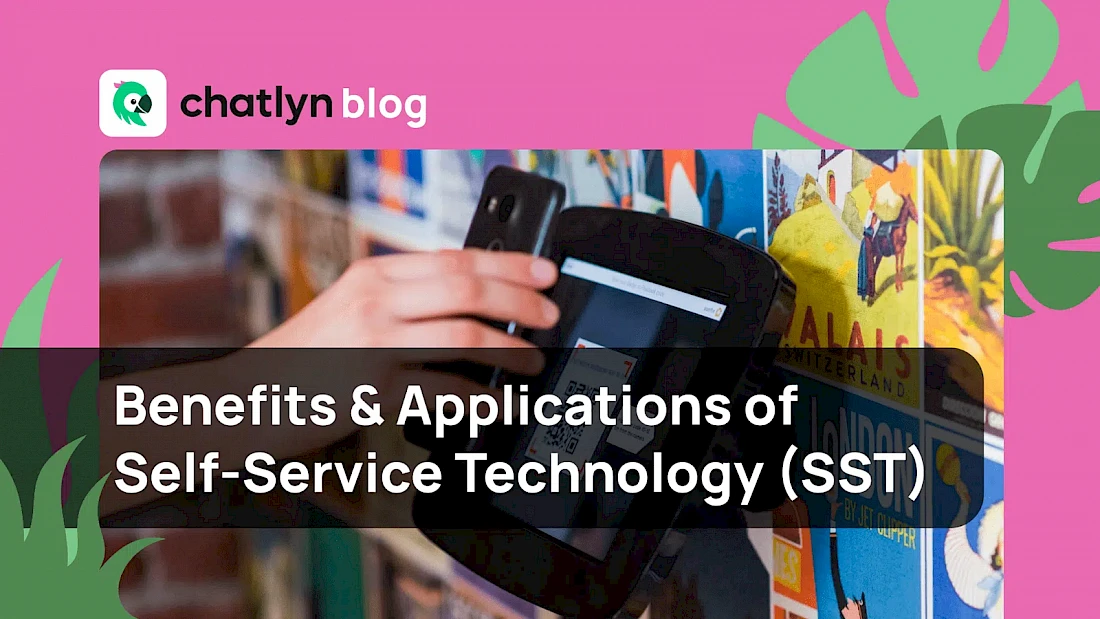In an era driven by technological innovation, self-service technology has emerged as a game changer in a variety of industries. This article delves into the realm of self-service technology, exploring its examples, benefits, and applications. From banking to service marketing to hotels and restaurants, self-service technology has revolutionized the way companies interact with their customers. Let's take a journey to discover the potential and importance of this transformative technology.
Understanding Self-Service Technology and its meaning:
Self-service technology refers to a range of technology solutions that enable customers to access services, information, or complete transactions on their own, without the need for direct human intervention. These technologies empower customers by increasing their autonomy and convenience, while streamlining processes for businesses.
Examples of self-service technologies include:
Interactive Kiosks:
A prime example of self-service technology is the interactive kiosk. These easy-to-use terminals have revolutionized customer interactions by offering a wide range of functionalities. From retail stores to hotels, airports and transportation hubs, interactive kiosks allow customers to browse menus, explore products or services, place orders, make secure payments and access valuable information. They provide a convenient and seamless self-service experience that empowers
For an in-depth look at the benefits, deployment strategies, and real-world examples of self-service technology, we encourage you to read "Unlocking the Potential of Self-Service Devices and Tools": Discover how interactive kiosks and other self-service devices are transforming customer interactions and redefining service delivery in today's fast-paced digital age.
Mobile Applications:
Mobile apps are another example of self-service technology that allows customers to engage with companies via their smartphones or tablets. These apps offer a wide range of functionality, such as placing orders, making reservations, accessing personalized offers, and tracking transactions. They give customers the flexibility to interact with businesses anytime, anywhere.
Chatbots:
Another innovative self-service technology is the integration of chatbots powered by AI technology. Chatbots are virtual assistants that can interact with customers in real time, providing them with instant help and information. They can respond to customer queries, solve common problems, and guide users through various processes.
With advances in AI technology, chatbots are becoming increasingly sophisticated and capable of understanding natural language. This means that customers can simply ask questions or request help, and the chatbot will intelligently analyze the query and provide accurate answers.
For businesses, chatbots offer several benefits. They can handle a large volume of customer queries simultaneously, reducing the need for human customer service agents. This results in cost savings and improved operational efficiency. In addition, chatbots are available 24 hours a day, 7 days a week, providing customers with round-the-clock assistance, increased convenience, and quick responses.
A notable example of an AI-powered chatbot is chatlyn. chatlyn is an AI-powered chatbot platform that seamlessly integrates into a company's website or messaging platform. It is designed to understand and effectively respond to customer queries, providing personalized assistance and driving customer engagement. With its advanced natural language processing capabilities, chatlyn ensures a seamless and efficient self-service experience for customers.
To experience the power of AI-based chatbots firsthand, you can explore chatlyn at https://chatlyn.ai. Discover how this innovative self-service technology can improve customer interactions, streamline support processes, and enhance your organization's overall customer experience.
Benefits of Self-Service Technology:
Increased customer convenience:
Self-service technology eliminates the need for customers to use traditional channels or wait for assistance. It offers convenience by providing instant access to services, reducing wait times, and allowing customers to engage at their own pace.
Improved efficiency:
By automating certain processes, self-service technology increases operational efficiency for companies. It reduces the burden on staff, allowing them to focus on more complex tasks while routine transactions are handled by self-service systems.
Cost savings:
Implementing self-service technology can result in cost savings for organizations. By reducing labor requirements, companies can allocate resources more efficiently, which can reduce operating costs in the long run.

Self-service technology in different industries:
Examples of Self-Service Technology in the Banking Industry:
Self-service technology has revolutionized the banking industry through automated teller machines (ATMs), which allow customers to perform transactions such as cash withdrawals, deposits, transfers, and balance inquiries independently, regardless of banking hours.
Examples of Self-Service Technology in Services Marketing:
In services marketing, self-service technology enables companies to provide customers with tools and platforms to access information, make reservations, schedule appointments, and interact with service providers. This puts customers in control of their service experience and increases customer satisfaction.
Examples of Self-Service Technology in Hotels:
The hotel industry has embraced self-service technology to improve the customer experience and streamline operations. Hotels have implemented self-billing kiosks and mobile check-in options that allow customers to bypass the traditional front desk and conveniently check in to their rooms. This self-service approach eliminates lengthy check-in processes, reduces wait times, and gives guests the freedom to manage their own arrival experience. In addition, self-service technology allows guests to access information about hotel services, order room service or even control room functions such as lighting and temperature through intuitive interfaces or mobile apps. By integrating self-service technology, hotels can offer a seamless and personalized stay, allowing guests to tailor their experience to their preferences. Read more about how to Strength Guest Retention in the Hotel Industry: Strategies and Solutions
Examples of self-service technology in restaurants:
In the restaurant industry, self-service technology has revolutionized the dining experience, providing numerous benefits to both customers and businesses. Self-service ordering kiosks or tablet-based systems that allow customers to easily browse menus, place orders, and customize their meals are becoming more common. By enabling self-service ordering, restaurants can reduce wait times, eliminate order inaccuracies and improve operational efficiency. In addition, self-service payment options, such as mobile payment apps or tabletop payment devices, offer customers a convenient and secure way to pay their bills. These technologies not only streamline the payment process, but also allow customers to split bills, provide instant feedback or seamlessly access loyalty programs. Self-service technology in restaurants gives customers more control over their dining experience, while restaurants benefit from greater operational efficiencies and increased customer satisfaction.
The role of self-service technology in your business:
Self-service technology plays a critical role in business by driving customer loyalty, increasing operational efficiency and providing a competitive advantage. It enables businesses to meet the changing needs of customers
Why Use Self-Service Technology?
Companies are turning to self-service technology to meet the growing demand for convenience, improve customer satisfaction and streamline operations. Self-service technology empowers customers, reduces costs, and enables organizations to deliver efficient and personalized experiences.
The bottom line:
In summary, self-service technology has emerged as a powerful tool across industries, transforming the way companies interact with customers and improving the overall customer experience. From banking to service marketing to hotels and restaurants, self-service technology offers a range of benefits including convenience, efficiency and cost savings.
By strategically implementing self-service technology, businesses can empower their customers, streamline operations and gain a competitive advantage in today's fast-paced digital landscape. However, striking the right balance between self-service and human-assisted interactions is critical, as not all customers prefer or are comfortable with technology-driven experiences.
To explore the vast potential of self-service technology in more detail, we invite you to read our comprehensive article, "The Ultimate Guide to Customer Self-Service: Benefits, Examples, and Strategies". This expert resource delves into the ins and outs of self-service technology, providing information on its benefits, real-world examples, and effective strategies for implementation. Whether you work in banking, service marketing, or hospitality, our article will equip you with the knowledge you need to harness the transformative power of self-service technology and deliver exceptional customer experiences.


